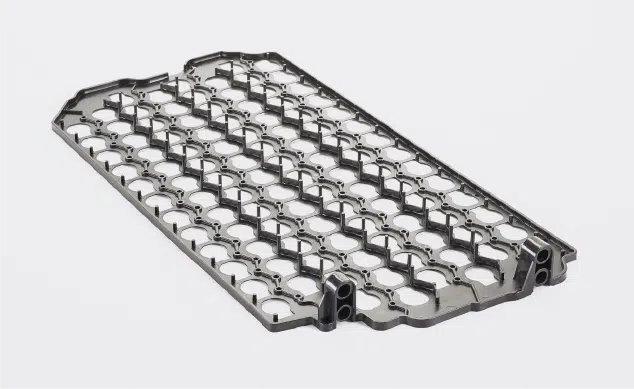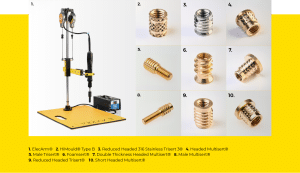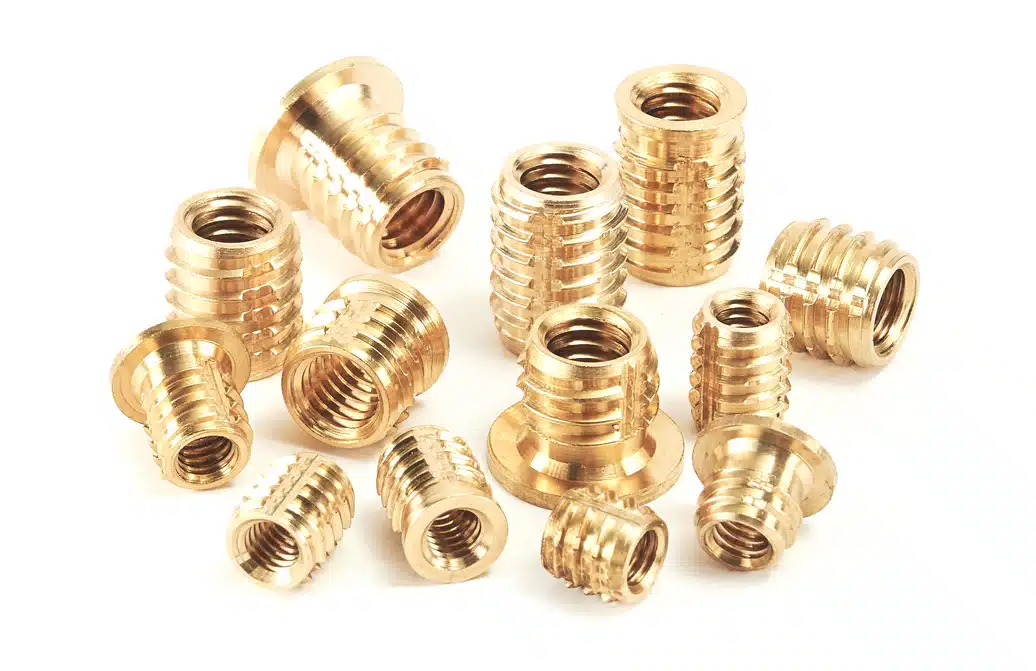Optimising threaded inserts for electric vehicle battery systems
Discover how involving Tappex at the start of a project can help avoid costly rework and potential product failures…
 In the rapidly evolving world of electric vehicle batteries, even the smallest components can have a big impact on performance, safety, and reliability. Projects can be complex and solutions aren’t always apparent if it’s something you haven’t experienced or come across before.
In the rapidly evolving world of electric vehicle batteries, even the smallest components can have a big impact on performance, safety, and reliability. Projects can be complex and solutions aren’t always apparent if it’s something you haven’t experienced or come across before.
This was the case for a manufacturer of specialised components for electric vehicle (EV) battery systems, specifically for highperformance automotive applications.
The challenge:
The customer was developing a 3D-printed prototype of a battery cell carrier which was crucial to an EV battery monitoring system. The plan was to transition to injection-moulded PC+ABS for full production. However, the in-house team lacked the necessary knowledge and experience when it came to specifying the appropriate threaded inserts for both the 3D-printed prototypes and the final injection-moulded parts.
Initially, the customer selected a Multisert press-in type insert for the 3D-printed nylon prototypes. While this solution performed adequately for the prototypes, it quickly became apparent that it wouldn’t be suitable for full-scale production. Heat insertion, the recommended method for PC+ABS, would have been challenging and costly due to the complex shape and size of the part.
 The Tappex fastening know-how
The Tappex fastening know-how
This is where the Tappex Technical Advisory Service came in, bringing our 60 years of fastening know-how and problemsolving expertise to the table.
Recognising the potential issues, we began with a comprehensive review of the application before recommending trialling our Trisert® range of selftapping inserts. These could be easily installed in both prototype and low-volume production parts using an economical Tappex hand installation tool. For higher volumes, the customer could scale up efficiently by investing in the Tappex Elecarm system.
To begin with there was limited information about the performance requirements, so the customer started initial tests with our un-headed self-tapping inserts:
- 137M4: Expected performance – 3Nm & 500kgf
- 145M6: Expected performance – 4Nm & 500kgf
This was evolved during the testing phase as specific performance requirements became apparent:
- M4 Insert: Required assembly torque of 4.5Nm
- M6 Insert: Required assembly torque of 7.5Nm
Based on the new torque specifications, we recommended switching to our Regular Headed Trisert® thread inserts:
- 336M4: For the M4 insert
- 345M6: For the M6 insert
Testing and adjusting for optimal performance
Given what we knew about the application details and drawing on our extensive empirical data, we were confident that the 345M6 insert would surpass the required torque specification. However, the 336M4 insert, while offering enhanced support from the mating part due to its full-headed design, reached only 4Nm before the surrounding material began to fail.
Our skilled technicians advised the customer that the assembly torque for the M4 insert might be too high for the material – the maximum recommended tightening torque for an M4 bolt (Grade 8.8) is approximately 2.54Nm, and for an M6 bolt (Grade 8.8), it’s about 10.47Nm, assuming a coefficient of friction of 0.14.

The result
After talking through the options, the customer decided to lower the assembly torque for the M4 insert to 2.5Nm, bringing it more in-line with the material’s capabilities and ensuring long-term reliability. The M6 insert exceeded its torque requirements, and the overall design was approved for production.
By partnering with Tappex early on, the EV battery component manufacturer was able to draw on expertise they didn’t have in-house, thereby avoiding costly rework and potential product failures.
The redesigned inserts met the rigorous demands of the EV battery system, which allowed them to proceed to full-scale production with confidence.
Bespoke threaded insert solutions from an expert team
In electric vehicle design and engineering, the smallest components can’t be overlooked. Our technical experts offer invaluable design support, bringing 60 years of expertise in threaded inserts to enhance your product’s performance and reliability.
 Our globally-renowned fastening solutions for plastics, woods, light metal alloys and composite materials are trusted across industries, including automotive. With Tappex, you’re not just preventing costly delays and redesigns – you’re investing in quality, innovation, and peace of mind.
Our globally-renowned fastening solutions for plastics, woods, light metal alloys and composite materials are trusted across industries, including automotive. With Tappex, you’re not just preventing costly delays and redesigns – you’re investing in quality, innovation, and peace of mind.
Whether you’re designing a new component or trouble-shooting an existing one, our technical experts are here to help your project run as smoothly as possible.

